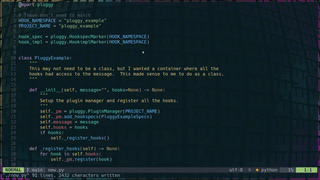Tags
Pluggy makes it so easy to allow users to modify the behavior of a framework without thier specific feature needing to be implemented in the framework itself.
I've really been loving the workflow of frameworks built with pluggy. The first one that many python devs have experience with is pytest. I've never created a pytest plugin, and honestly at the time I looked into how they were made was a long time ago and it went over my head. I use a data pipelining framework called kedro, and have build many plugins for it.
Making a plugin #
super easy to do
As long as the framework document the hooks that are available and what it
passes to them it's so easy to make a plugin. Its just importing the
hook_impl, making a class with a function that represents one of the hooks,
and decorating it.
from framework import hook_impl class LowerHook: @hook_impl def start(pluggy_example): pluggy_example.message = pluggy_example.message.lower()
installing pluggy #
Installing pluggy is just like most python applications, install python, make your virtual environment, and pip install it.
pip install pluggy
Making a plugin driven framework #
much less easy
At the time I started playing with pluggy, their docs were less complete, or I was just plain blind, but this was a huge part of the docs that were missing for me that now actually appear to be there. But to get some more examples out there, here is my version.
import pluggy # These don't need to match HOOK_NAMESPACE = "pluggy_example" PROJECT_NAME = "pluggy_example" hook_spec = pluggy.HookspecMarker(HOOK_NAMESPACE) hook_impl = pluggy.HookimplMarker(HOOK_NAMESPACE) class PluggyExampleSpecs: """ This is where we spec out our frameworks hooks, I like to refer to them as the lifecycle. Each of these functions is a hook that we are exposing to our users, with the kwargs that we expect to pass them. """ @hook_spec def start(self, pluggy_example: PluggyExample) -> None: """ The first hook that runs. """ pass @hook_spec def stop(self, pluggy_example: PluggyExample) -> None: """ The last hook that runs. """ pass class PluggyExample: """ This may not need to be a class, but I wanted a container where all the hooks had access to the message. This made sense to me to do as a class. """ def __init__(self, message="", hooks=None) -> None: """ Setup the plugin manager and register all the hooks. """ self._pm = pluggy.PluginManager(PROJECT_NAME) self._pm.add_hookspecs(PluggyExampleSpecs) self.message = message self.hooks = hooks if hooks: self._register_hooks() def _register_hooks(self) -> None: for hook in self.hooks: self._pm.register(hook) def run(self): """ Run the hooks in the documented order, and pass in any kwargs the hook needs access to. Here I am storing the message within this same class. """ self._pm.hook.start(pluggy_example=self) self._pm.hook.stop(pluggy_example=self) return self.message class DefaultHook: """ These are some hooks that run by default, maybe these are created by the framework author. """ @hook_impl def start(pluggy_example): pluggy_example.message = pluggy_example.message.upper() @hook_impl def stop(pluggy_example): print(pluggy_example.message) if __name__ == "__main__": """ The user of this framework can apply the hook in their own code without changing the behavior of the framework, but the library has implemented it's own default hooks. """ pe = PluggyExample( message="hello world", hooks=[ DefaultHook, ], ) pe.run()
Modifying behavior #
as a user of PluggyExample
Now Lets pretent the user of this library likes everything about it, except, they don't like all the shouting. They can either search for a plugin on Google, github, or pypi and find one, or make it themself. the magic here is that they do not need to have the package maintainer patch the core library itself.
class LowerHook: """ This is a new hook that a plugin author has created to modify the behavior of the framework to lowercase the message. """ @hook_impl def start(pluggy_example): pluggy_example.message = pluggy_example.message.lower() from pluggy_example import PluggyExample pe = PluggyExample( message="hello world", hooks=[ DefaultHook, LowerHook ], ) pe.run()
Running Pluggy Example #
Here is a short clip of me running the pluggy example in it's default state, then adding the LowerHook, and running a second time.

